A COVID-19 Chinese New Year: Simple celebrations and safety measures at restaurants, shops
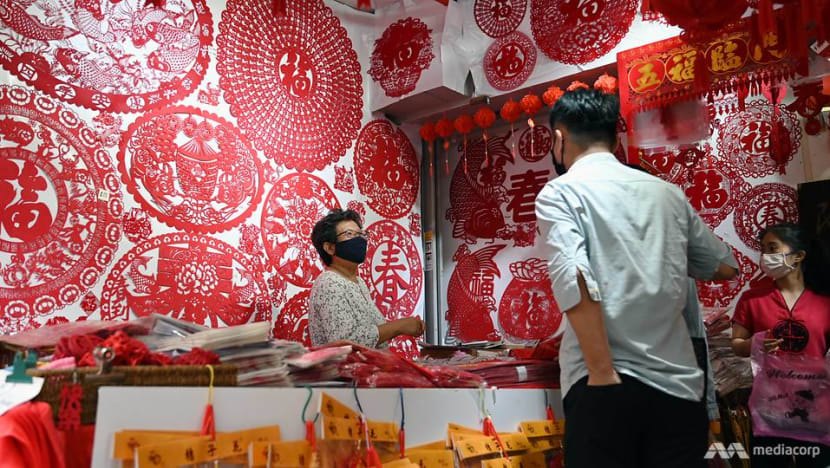
Shoppers at Chinatown to purchase Chinese New Year goods on Feb 5, 2021. (Photo: Marcus Mark Ramos)
SINGAPORE: Where they used to visit five homes of about 20 people each over several days, this year, the Cheongs will have a more muted Chinese New Year.
“(We are) just having a simple family reunion dinner on Chinese New Year eve and celebrating with our extended family via Zoom,” 63-year-old Eric Cheong told CNA.
“The difference is that we won’t be visiting our relatives’ houses and meeting everyone in person. Usually we’d be visiting up to five homes but keeping everyone safe is the objective.”
While Ms Tay Ying Hui, 25, will still be visiting her extended family, it will be “controlled”, and reunion dinners will be held in smaller groups, she said.
“My family and I would try to go to public places with festival decor, but considering the extent of hygiene and crowd regulations, it’s likely that this year would call for a different experience,” she said.
She added that with the strictly enforced regulations, Chinese New Year would feel like a “forced” and “unpleasant” shopper’s experience.
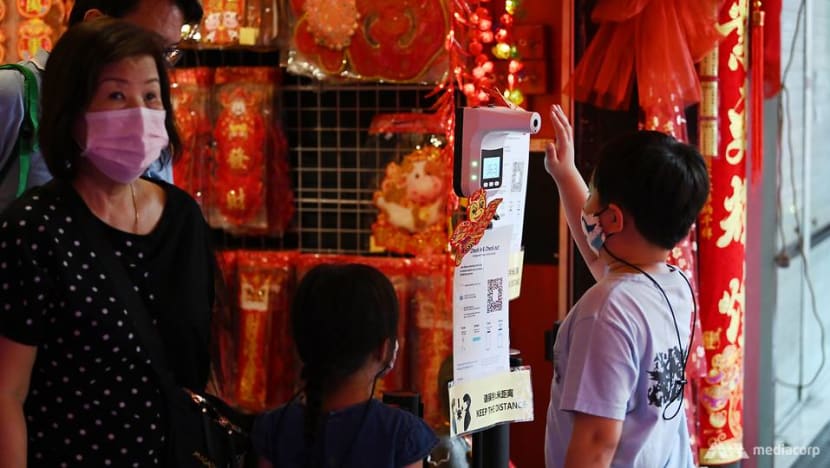
“The traditional food hunt and exploration at Chinatown has been clamped down such that food samples are now being handed in small packages of limited quantities.
“It kind of defeats the purpose of the traditional ‘all can try’ and affects Chinese New Year shopping,” she said, adding that Zoom gatherings and online reunion dinners take away from the festive spirit of gatherings.
However, she understands that this is all in the name of public safety, she said, adding that it “can’t be helped”.
“I guess we’ll bite the bullet for this year and pray that things get better.”
RETAILERS, RESTAURANTS READY WITH COVID-19 SAFE MANAGEMENT MEASURES
On Jan 22, the COVID-19 multi-ministry task force announced that households should only receive a maximum of eight visitors per day from Jan 26 onwards, due to a rise in community COVID-19 cases and possible risk of transmission over the festive period.
As far as possible, people should also visit no more than two households per day, said Education Minister Lawrence Wong at the press conference.
In addition, Singaporeans should not verbalise the usual auspicious phrases during the Chinese New Year tradition of “lohei”, and face masks should be worn during the tossing of yusheng, he said.
READ: Cap of 8 visitors per day in each household from Jan 26 as Singapore tightens COVID-19 measures
READ: Rules on visiting and tossing yusheng: 7 things to note this Chinese New Year amid COVID-19
Retailers and restaurants told CNA that they have COVID-19 safe management measures in place, in preparation for Chinese New Year shoppers.
The Crystal Jade Group said that its restaurants will not be able to accommodate as many dine-in customers as compared to previous years. Currently, all its fine-dining restaurants are fully booked, while its casual dining outlets in heartland malls are almost 90 per cent booked for Chinese New Year eve, said a spokesperson.
“We have opened up more slots for dine-in for reunion meals, including Chinese New Year eve lunch slots to avoid overcrowding,” said the spokesperson,
Crystal Jade Group has implemented a one-metre spacing between tables and a “rigorous” cleaning process and protocol for the front- and back-of-house, among others, the spokesperson said.
Staff are briefed to keep a safe distancing from customers, especially when serving and preparing “lohei”. The Crystal Jade Group has also extended the time between dining slots to ensure that staff have sufficient time to sanitise the dining area “thoroughly” before the next group of diners.
In addition, front-of-house staff have been coached on how to approach and remind customers of safe distancing practices, to ensure that everyone follows the rules, said the spokesperson.
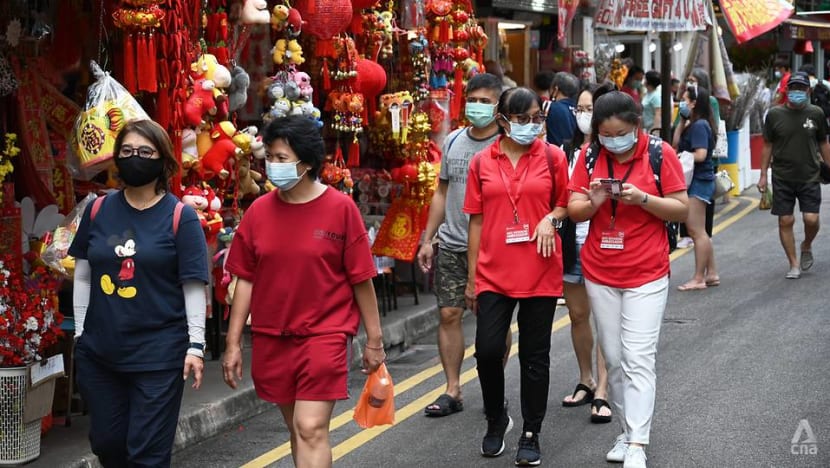
Diners at the Paradise Group of Restaurants will have to do safe entry check-ins, have their temperature taken and sanitise their hands upon entry. Tables will be placed one-metre apart and the restaurants will limit eight diners to a table.
“Safe distancing, no mingling between tables and limitation of 8 persons per table will be monitored closely by floor staff and reminders will be communicated to customers strongly.” said its spokesperson.
Chinese New Year is usually a “peak shopping period” for florist Far East Flora, said sales and marketing director Peter Cheok, as customers tend to place festive plants and flowers in their homes for the new year.
As travelling is restricted, and night markets and Chinatown hotspots are closed, Far East Flora expects to receive more customers, said Mr Cheok.
Some safe management protocols that the company has in place include safe entry check-ins, temperature checks, a people counter device at its main outlets along Thomson Road and safety distances of one metre when paying.
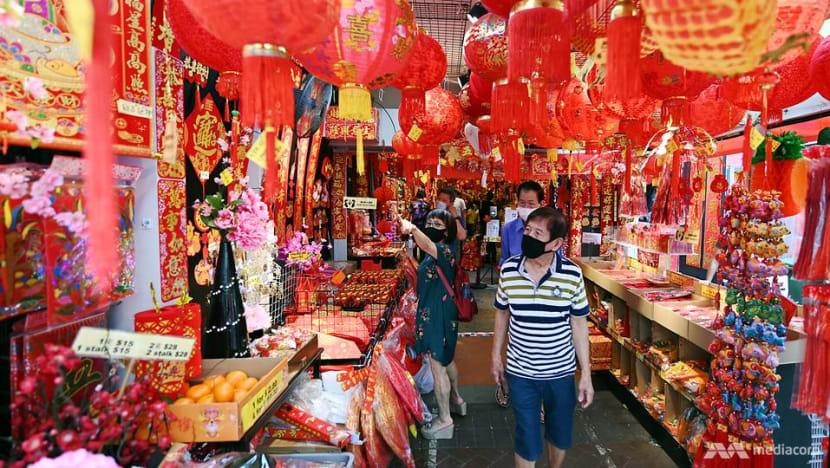
Staff will also monitor customers and disperse those that crowd together. All customers and staff will have to keep their masks on at all times, even during photo-taking.
The Chinatown Business Association has advised tenants of the Government's COVID-19 safe management measures, and suggested that they look into pre-order sales and collection format.
The association added that it could look into publicising tenants’ pre-order forms on its social media platforms. It has also placed social distancing stickers on its Street Market, the spokesperson said.
WATCH: Chinatown Complex launches website to help vendors after cancellation of Chinese New Year bazaar | Video
Chinatown Complex Hawkers Merchant Association vice-secretary Cornelius Tan said that the hawker centre - Singapore’s largest - is expecting a 20 per cent reduction in crowd size this year - mostly missing numbers from tourism.
The association has deployed safety ambassadors across the three levels of Chinatown complex, he said.
It also has a public announcement system that will play recorded safety messages reminding customers to wear masks and keep a safe distance from one another.
Meanwhile, cleaning vendors and stall holders will periodically disinfect the tables and stalls.
To reduce crowd size, the association has gone online for this year’s Chinese New Year festival. Customers can make their purchases online and have their orders delivered, said Mr Tan.
“We will actively keep a look out and be vigilant during this festive season in ensuring public health safety.”
CHINATOWN RESTRICTIONS
To further lower the COVID-19 risk, the Chinese New Year street light-up will not be turned on for four days as part of additional measures to better space out crowds in Chinatown, said the Ministry of Sustainability and the Environment (MSE) on Friday (Feb 5).
In a press release, MSE said the light-up along South Bridge Road, New Bridge Road and Eu Tong Sen Street will not be turned on from Feb 5 to Feb 7, as well as on Feb 11. Visitors who would like to observe the festive light-up are encouraged to do so on weekdays or to visit the Chinatown Festivals website for a 360-degree virtual tour of the light-up, which begins on Friday.
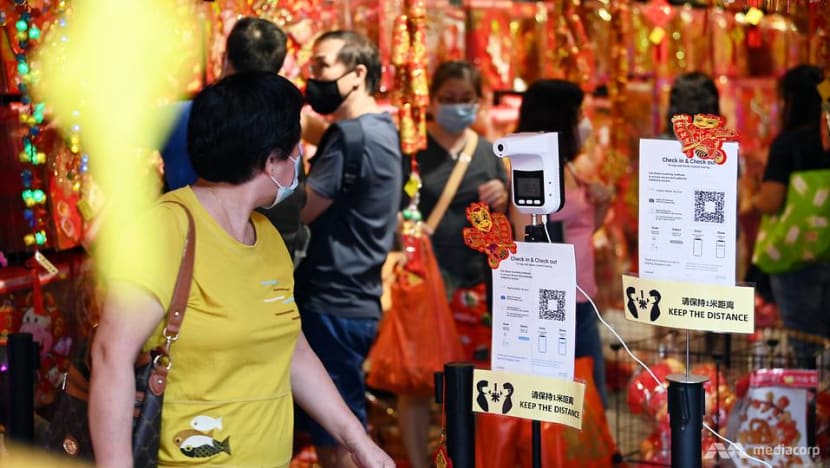
Access control measures may be implemented at Pagoda Street and Trengganu Street during peak hours over the weekends to ensure sufficient space for visitors. Visitors should consider the additional time needed to walk and queue in order to enter the busier stretches of Pagoda Street and Trengganu Street.
Other measures may be implemented for crowd management and visitor safety depending on the ground situation, including closing Temple Street to motor traffic, said MSE.
CUSTOMERS TURNING TO E-COMMERCE
Shopee Singapore’s head of marketing Tiger Wang noted that the online shopping portal observed a “six-time uplift” in demand for snacks and other essentials in the lead-up to Chinese New Year.
Most people have gone online to buy food products and seasonal goods, he said, which include roasted suckling pigs, abalone and seafood.
“The acceleration of digitalisation since the pandemic has caused deep, irreversible shifts in consumer purchasing habits. The closure of offline events including the annual Chinese New Year Bazaar in Chinatown has also seen consumers turn to e-commerce to fulfill all their essential and personal needs - including Chinese New Year related products,” said Mr Wang.















